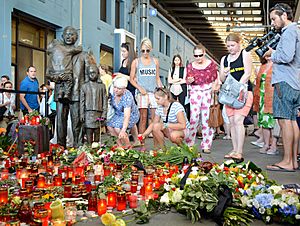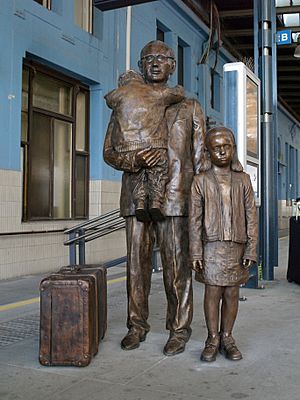Nicholas Winton facts for kids
Quick facts for kids
Nicholas Winton
|
|
|---|---|
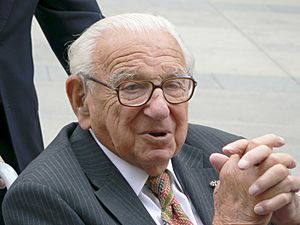
Winton in Prague on 10 October 2007
|
|
| Born |
Nicholas George Wertheim
19 May 1909 |
| Died | 1 July 2015 (aged 106) |
| Resting place | Braywick Cemetery, Maidenhead, Berkshire, England |
| Education | Stowe School |
| Occupation | Banker |
| Spouse(s) |
Grete Gjelstrup
(m. 1948; d. 1999) |
| Children | 3 |
| Military career | |
| Allegiance | United Kingdom |
| Service/ |
Royal Air Force |
| Years of service | 1940–1954 |
| Rank | Flight lieutenant |
| Awards | British Hero of the Holocaust |
Sir Nicholas George Winton was a British hero who saved many children from danger during World War II. He was born Nicholas George Wertheim on 19 May 1909. His parents were from Germany and had moved to Britain.
Winton helped rescue 669 children, mostly Jewish, from Czechoslovakia. This happened just before World War II began. He visited Czechoslovakia and made a list of children who needed help. Then, he returned to Britain to find homes and sponsors for them. This amazing effort became known as the Czech Kindertransport, which means "children's transport" in German.
For almost 50 years, no one knew about his brave actions. Then, in 1988, he was invited to a BBC TV show called That's Life!. There, he was reunited with many of the children he had saved. He also met their children and grandchildren. The British newspapers called him the "British Oskar Schindler".
In 2003, Queen Elizabeth II made him a knight for his "services to humanity". This was for saving Jewish children from Nazi-occupied Czechoslovakia. In 2014, he received the highest honor from the Czech Republic, the Order of the White Lion. Sir Nicholas Winton passed away on 1 July 2015, at the age of 106.
Contents
Early Life
Nicholas Winton was born in Hampstead, London, on 19 May 1909. His parents, Rudolph and Barbara, were Jewish and had moved to London from Germany. Nicholas was the middle of three children. His family changed their last name from Wertheim to Winton to fit in better in Britain. They also became Christians, and Nicholas was baptized.
In 1923, Winton started at Stowe School. He left school without getting any special qualifications. He then worked at banks in Hamburg, Berlin, and Paris. After that, he became a stockbroker in London. Winton was also interested in helping others and was friends with many people who wanted to make society fairer.
He was a very good fencer and was chosen for the British team in 1938. He hoped to compete in the 1940 Olympics, but they were canceled because of World War II.
Saving Children
In late 1938, Winton was planning a skiing trip. But he changed his plans after hearing about the terrible situation in Prague. He went to Prague to help his friend Martin Blake, who was working with refugees. Nazi Germany was taking over Czechoslovakia, and many Jewish families were in great danger.
Winton and other volunteers worked hard to help children from these families. They set up their office at a dining room table in a hotel. Winton stayed in Prague for about a month. In November 1938, the British government agreed to let children under 17 enter Britain. They needed a place to stay and a guarantee of £50 for their return.
Getting to Safety
A big challenge was getting permission for the children to cross into the Netherlands. The children needed to take a ferry from Hook of Holland. After a terrible event called Kristallnacht in Germany, the Dutch government had closed its borders to Jewish refugees.
Winton managed to get the necessary guarantees from Britain. This helped the children cross the Netherlands safely. He found homes in Britain for 669 children. Many of these children's parents later died in concentration camps. Winton's mother also helped him find homes and hostels for the children. He even put photos of the children in a magazine called Picture Post to find families to take them in.
He also asked leaders in the United States, like President Franklin D. Roosevelt, to take more children. Winton believed that 2,000 more children could have been saved if other countries had helped. Only Sweden took some children besides Britain.
The last group of children was supposed to leave Prague on 1 September 1939. But on that very day, Adolf Hitler invaded Poland, starting World War II. The train could not leave. Out of the 250 children on that train, only two survived the war.
Winton always said that many other people helped with the rescue work. These included Doreen Warriner, Trevor Chadwick, and Beatrice Wellington. Winton was only in Prague for a few weeks before the Nazis took over. He never even went to the main railway station in Prague. He praised Chadwick for dealing with the difficult and dangerous work in Prague.
Some Children He Saved
Many of the children Sir Nicholas Winton saved grew up to do amazing things. Here are a few:
- Leslie Baruch Brent: A scientist who did important work on how our bodies fight off diseases.
- Alf Dubs, Baron Dubs: A British politician.
- Heini Halberstam: A famous mathematician.
- Renata Laxova: A doctor who studied children's genes.
- Karel Reisz: A well-known filmmaker.
- Joe Schlesinger: A Canadian TV journalist.
- Yitzchok Tuvia Weiss: A Chief Rabbi in Jerusalem.
More than 370 of the 669 children Winton saved have never been found. Many of them might not even know the full story of how they survived the war.
World War II Service
When World War II started, Winton first chose not to join the army. He worked with the Red Cross. But in 1940, he changed his mind and joined the Royal Air Force. He served in the Air Force until 1954 and became a Flight lieutenant.
After the War
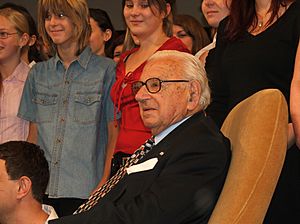
After the war, Winton worked for international organizations in Paris. There, he met Grete Gjelstrup, a Danish secretary. They got married in 1948 and had three children. Their youngest son, Robin, had Down syndrome. Robin sadly passed away from meningitis just before his sixth birthday. This deeply affected Winton, and he started a support group for families with children with Down syndrome. This group later became Mencap in Maidenhead.
How He Was Recognized
Winton's amazing work went unnoticed for almost 50 years. In 1988, his wife found a detailed scrapbook in their attic. It had lists of the children he saved, their parents' names, and the families who took them in. She gave the scrapbook to a researcher. Letters were sent to the addresses, and 80 of "Winton's children" were found in Britain.
The world learned about his work in February 1988 on the BBC show That's Life!. Winton was in the audience. The host, Esther Rantzen, showed his scrapbook and explained what he had done. She then asked if any of the people in the audience were among the children Winton saved. More than two dozen people stood up and applauded him. Then, she asked if anyone present was a child or grandchild of someone Winton saved, and the rest of the audience stood up. It was a very emotional moment.
Winton was also featured on the TV show This Is Your Life in 2003. He became a symbol of British help for refugees before World War II.
His 100th Birthday
To celebrate his 100th birthday, Winton flew over the White Waltham Airfield in a small plane. It was piloted by the daughter of one of the boys he had saved.
His Passing
Sir Nicholas Winton passed away peacefully on 1 July 2015, at the age of 106. He had been in the hospital for a week. His death came exactly 76 years after 241 of the children he saved left Prague on a train.
Awards and Honors
Winton received many honors for his kindness and bravery:
- In 1983, he was made a Member of the Order of the British Empire (MBE). This was for his work helping to set up homes for the elderly.
- In 2003, he was made a Knight by Queen Elizabeth II. This was for his work saving children from Czechoslovakia.
- In 2010, the British Government named him a British Hero of the Holocaust.
- In 1998, he received the Order of Tomáš Garrigue Masaryk from the Czech President.
- In 2008, the Czech government nominated him for the Nobel Peace Prize.
- A small planet, 19384 Winton, was named after him by Czech astronomers.
A statue of Winton stands at the main railway station in Prague. It was unveiled in 2009. There are also three memorials at Liverpool Street station in London, where the Kindertransport children arrived. Another statue of Winton was unveiled in Maidenhead in 2010.
Winton was raised Christian, but he was not very religious as an adult. He believed strongly in ethics and doing the right thing.
In 2013, he received the Wallenberg Medal. The next year, a writing competition for high school students was started in his honor. In 2015, he was given the Freedom of the City of London.
The Winton Train
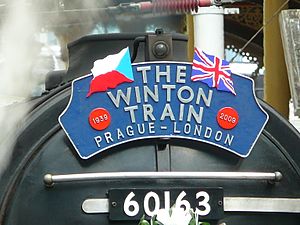
On 1 September 2009, a special "Winton Train" traveled from Prague to London. It used old steam locomotives and carriages from the 1930s. Several of the surviving "Winton children" and their families were on board. Winton himself welcomed them in London.
This event marked 70 years since the last Kindertransport train was supposed to leave Prague. That train was stopped by the start of World War II. A statue of Winton was also unveiled at the Prague railway station that day.
Order of the White Lion
On his 105th birthday in 2014, it was announced that Winton would receive the Czech Republic's highest honor. This was for giving Czech children "the greatest possible gift: the chance to live and to be free." On 28 October 2014, he received the Order of the White Lion (First Class) from Czech President Miloš Zeman. Winton was able to meet some of the people he rescued 75 years earlier. He thanked everyone for the "enormous expression of thanks" for something that happened "nearly 100 years ago."
List of National Honours
- 1983:
 Member of the Order of the British Empire (UK)
Member of the Order of the British Empire (UK) - 2003:
 Knight Bachelor (UK)
Knight Bachelor (UK) - 2014:
 Order of the White Lion 1st Class (Czech Republic)
Order of the White Lion 1st Class (Czech Republic)
In Popular Culture
Winton's story has been told in several films:
- All My Loved Ones (1999): A drama film.
- The Power of Good: Nicholas Winton (2002): A documentary that won an Emmy Award.
- Nicky's Family (2011): Another documentary drama.
He was also featured in the documentary Into the Arms of Strangers: Stories of the Kindertransport (2000), which won an Oscar.
In 2014, Winton said that he thought he had "made a difference to a lot of people." He also said that he felt "the world today is in a more dangerous situation than it has ever been."
On 19 May 2020, Google honored Winton on what would have been his 111th birthday with a special Google Doodle.
Actors Anthony Hopkins and Johnny Flynn will play Winton in a film called One Life.
Memorials
Many memorials have been created to remember Sir Nicholas Winton:
- In 2016, a special bell-ringing method was named Sir Nicholas Winton Delight.
- A memorial service was held in London in 2016, attended by many of the people he saved.
- A memorial concert was held to support Syrian refugee children.
- In 2017, a memorial garden for Winton was opened in Maidenhead.
Images for kids
See also
 In Spanish: Nicholas Winton para niños
In Spanish: Nicholas Winton para niños
 | Selma Burke |
 | Pauline Powell Burns |
 | Frederick J. Brown |
 | Robert Blackburn |


